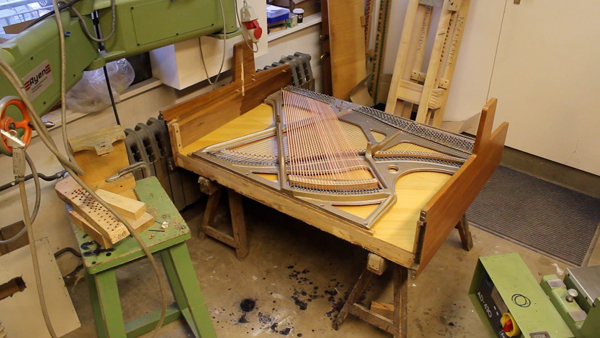A frequently asked question by many of my clients during a piano tuning is “will my piano ever need new strings?”
If a string snaps during the tuning process a small charge is made for a new string around £20 for a new string if it’s in the bass (a bit less if in the tenor or treble section) and £20 labour to fit the string. Putting a new string on takes me about 20 minutes. I would say a string breaks in about one in every hundred jobs so it’s not uncommon, but not something to be unduly concerned about.
If a string is missing from a piano it isn’t ideal, but one string missing isn’t going to effect the overall tension enough to cause problems. It can take between a week and a month for a bass string to be remade and sent back to me. If it’s in the very low end of the piano then the note won’t strike as the hammers for those keys only strike one string each. The upper bass the note will sound slightly weaker as the hammer will hit one string instead of two.
In the middle and treble sections things get a little more complicated and regular piano wire is used up here. Some of them are connected to the hitch pins with a coil at the other side of the string. Most of them wrap around the hitch pin meaning that if a string snaps in this section the hammer effectively hits two strings or one string depending on which string has snapped.
Re-stringing a whole piano is expensive (£2000+), but if it was part of a restoration process for an old but high-end piano, it might be worth it if done in conjunction with the replacement of a dried-out wrest plank and loose, rusted wrest pins. As a general rule, most pianos on the market would not benefit enough from such a process to be worth such an expenditure. I have found that many of the pianos I’ve encountered while piano tuning in West Yorkshire have some rusty strings and while this will negatively effect the tone, there are other much worse factors in tonal degradation. Rusty strings can also be cleaned on request, though again, much care has to be taken with health and safety plus the fragility of certain strings.
New strings do have an impact on the sound of a piano but there are so many other factors that contribute to good tone. And do you know what the most important one is? You guessed it: having your piano tuned and serviced regularly. Please get in touch with the Leeds piano tuner today to book your piano tuning: 0754 266 7040
